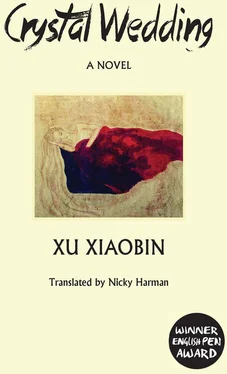Xiaobin Xu - Crystal Wedding
Здесь есть возможность читать онлайн «Xiaobin Xu - Crystal Wedding» весь текст электронной книги совершенно бесплатно (целиком полную версию без сокращений). В некоторых случаях можно слушать аудио, скачать через торрент в формате fb2 и присутствует краткое содержание. Год выпуска: 2016, Издательство: Balestier Press, Жанр: Современная проза, на английском языке. Описание произведения, (предисловие) а так же отзывы посетителей доступны на портале библиотеки ЛибКат.
- Название:Crystal Wedding
- Автор:
- Издательство:Balestier Press
- Жанр:
- Год:2016
- ISBN:нет данных
- Рейтинг книги:3 / 5. Голосов: 1
-
Избранное:Добавить в избранное
- Отзывы:
-
Ваша оценка:
- 60
- 1
- 2
- 3
- 4
- 5
Crystal Wedding: краткое содержание, описание и аннотация
Предлагаем к чтению аннотацию, описание, краткое содержание или предисловие (зависит от того, что написал сам автор книги «Crystal Wedding»). Если вы не нашли необходимую информацию о книге — напишите в комментариях, мы постараемся отыскать её.
Crystal Wedding — читать онлайн бесплатно полную книгу (весь текст) целиком
Ниже представлен текст книги, разбитый по страницам. Система сохранения места последней прочитанной страницы, позволяет с удобством читать онлайн бесплатно книгу «Crystal Wedding», без необходимости каждый раз заново искать на чём Вы остановились. Поставьте закладку, и сможете в любой момент перейти на страницу, на которой закончили чтение.
Интервал:
Закладка:
Many friends had warned her to avoid the old woman at Window 3 like the plague. She would refuse your visa application for sure, especially if you were a woman. Yang had made a point of telling her that if she was called to Window 3, she would be better off playing deaf, and missing her turn. She almost did that, but was overcome with a sudden urge to take her chances. Maybe she would be lucky.
She approached the window to which she had been summoned, with all the poise she could muster, in the manner of a gallant Communist Party martyr in a film epic. She saw the legendary ‘old woman’. She was not old, forty-six or forty-seven at the most, but she was scrawny and old-maidish. Tianyi registered the frown lines on her forehead with trepidation. She would never be able to stand up to a woman with frown lines like that.
The ‘old woman’ questioned her closely, first in Chinese, then in English. She tried to answer in English, and the woman appeared to be listening earnestly, nodding away. Tianyi felt better and better, until she finally got out the entire spiel she had prepared, in fluent English. Finally, the old woman stopped asking questions and picked up the sheaf of papers as if she was going to sign on the spot. Then suddenly she put another question, one which Tianyi did not hear properly. She said: ‘So, apart from your child, you wouldn’t need to come back to China at all, would you?’ The question would have sounded convoluted enough in Chinese, let alone in English, let alone after such gentle questioning. Tianyi fell right into her trap and, nodded dumbly even though she had not understood, thus, in a single instinctive response, undoing all her previous efforts. The woman’s face grew serious. Tianyi realized she had committed a fatal error.
Her short-term passport was stamped with a visa refusal. At that instant, she suddenly thought that the hatchet-faced visa officer was just like the soft-faced woman in the academy’s Personnel Department. It did not matter whether you lived in the east or the west, it was all essentially the same, people counted for nothing when it came to national interests. Both the policewoman and this woman were the padlock on the shackles, the guardians of authority. She had schemed and fought so hard for freedom — but ultimately she was to be disappointed.
Lian, however, got a visa with no problem at all. Three months after Tianyi was turned down, he went to America as part of an investigative team from the Planning Commission.
His first letter from America was a long one. He gave her a blow-by-blow account of everything that had happened. He had travelled on his own and had no sooner got off the plane than he discovered he had lost the address where he was staying. A kind-hearted elderly American couple took him under their wing and to a hotel. He was so grateful that he gave them one of the small gifts he had taken with him, a satin pincushion in the shape of a pumpkin dolly. He could not say enough good things about the Americans he met — and enough bad things about the overseas Chinese. He finished by adding portentously that although America was wonderful, it belonged to the Americans, just the same as China belonged only to the Chinese.
Tianyi had to admit to herself that Lian was quite clever. A lot of what he said and many of the conclusions he came to were pretty much right. She even thought that Lian would be best-suited to a job with a think-tank — he was excellent at dreaming up wonderful ideas for other people, no good for anything else.
After he went, leaving Tianyi and Niuniu at home, she felt a sense of release. Like many people, she had an instinct for avoiding freedom and another instinct that longed for freedom. Now, she found being stuck at home for too long unbearable.
Tianyi took up the activity she had been good at as a child, painting. She had not lifted a brush for many years, and soon found herself engrossed in it. Apart from a couple of visits each week to the academy and caring for Niuniu, she spent the rest of the time painting. She felt inspired: she used abstract lines to express her life and loves, in a way that only she could understand. She found the fineness of this technique intoxicating, and was completely and utterly absorbed in her own little world. If there is real happiness in this world, then that summer of 1990, Tianyi found it.
When, a month later, friends came to visit Tianyi, they were flabbergasted at the paintings that filled the apartment. After a long pause, there was a chorus of exclamations: ‘You must have an exhibition! It would be such a pity not to show these paintings!’ So, that autumn the Yang Tianyi exhibition was shown at the Central Gallery of Art. Almost all Tianyi’s friends in Beijing attended the launch, including one that Tianyi had never imagined in a million years would come. Her name was Qing, and she was twenty-three years old. Peng brought her, and introduced her as Zheng’s girlfriend when he was in the South.
Tianyi had mixed feelings. On the one hand, it was quite normal that Zheng should have had a girlfriend — after all, he was a hot-blooded young man full of life and energy. On the other hand, it niggled her that Zheng had never mentioned the girl to her. For ‘Zheng’s girlfriend’ suddenly to spring out of nowhere was hard to swallow. But Qing was a very likeable young woman. She immediately treated Tianyi with a warmth that the latter, who hid a soft heart under her sharp tongue, found hard to resist.
Qing’s rather flat face, large eyes and mouth that tilted up at the corners as she spoke made her look like a doll. She said she knew all about Tianyi — on her first trip to Beijing, she and Zheng had cycled with a group of friends to Haidian and on the way, Zheng had suddenly braked, pointed to a grey tower block and said: ‘That’s where Tianyi lives.’ ‘Take us to meet her,’ said Qing, but Zheng said firmly; ‘No, I can’t do that.’ Peng had said with a wicked laugh: ‘You don’t know but this woman’s Zheng’s secret goddess. He’d never agree to take you ordinary mortals to see her!’ Zheng had flushed and then lapsed into silence, said Qing. She had been very struck by that.
‘That was when I knew who he really loved,’ she concluded. Tianyi felt her heart swell. Then the tears came.
Qing’s candour made Tianyi take the girl under her wing. From the autumn of 1990 to the spring of 1991, when Lian returned from America, she stayed at their house. The two women got along well enough. Qing was good-hearted, although she had a young girl’s failings — was sometimes scatter-brained, loud-mouthed, unable to look after herself, and so on. But on the whole she was a good girl. What most touched Tianyi was that while the exhibition was on, Qing spent two whole evenings mounting the paintings one by one. Even Tianyi got fed up with the mounting, but Qing kept on working away. So as soon as the exhibition closed, Tianyi agreed to Qing’s request: she would take the girl to meet Zheng’s parents.
The exhibition made Tianyi one of the hottest artists in town. After the turmoil of 1989 through 1990, the autumn of that year should have brought peace and quiet, but the special exhibition at the Central Gallery of Art had everyone at a fever-pitch of excitement. In the Visitors Book, someone had written in large letters: New! Wild! Amazing! Early one morning, the Chinese art world’s leading critic, Wu Mengshi, paid a visit. The old man was taken around in his wheelchair and, when he saw the paintings, his eyes lit up. He nodded, and muttered to himself: ‘Only someone without formal art training would dare to paint like this.’ Tianyi shot a quick look at him and felt that this was high praise.
Then two art dealers asked to buy the three largest paintings in The Tree of Knowledge series, offering to pay $3,000 for each. Tianyi was suitably impressed but, having thought long and hard, decided that she could not bear to part with them. Each was a one-off, there would never be another one like it. Each line, she thought, was drawn from her flesh and blood. She could not let the paintings go. Of course the money was good, but she felt money had little to do with her.
Читать дальшеИнтервал:
Закладка:
Похожие книги на «Crystal Wedding»
Представляем Вашему вниманию похожие книги на «Crystal Wedding» списком для выбора. Мы отобрали схожую по названию и смыслу литературу в надежде предоставить читателям больше вариантов отыскать новые, интересные, ещё непрочитанные произведения.
Обсуждение, отзывы о книге «Crystal Wedding» и просто собственные мнения читателей. Оставьте ваши комментарии, напишите, что Вы думаете о произведении, его смысле или главных героях. Укажите что конкретно понравилось, а что нет, и почему Вы так считаете.












